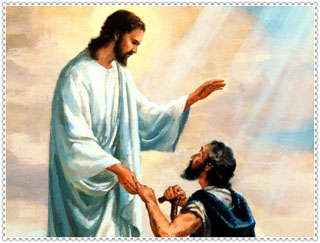复活节的由来
History of Easter

耶稣基督
复活节的由来
复活节的英文单词是:Easter Day。复活节规定了这个节日必定是在星期日举行的。在西方社会,复活节是重大节日。复活节假期通常都是由星期五开始,直至星期一。为何只有星期日一天被称为“复活节”呢?
原来《圣经》上面记载着,耶稣基督被门徒出卖,继而被带上法庭,并在星期五被人钉死于十字架上。由于犹太人的法律,星期六是安息日,一切活动都要停止,基督的追随者只好在星期五日落前将基督的遗体草草安葬在一个墓穴内,就匆匆离开。
星期日早上,当人们再次去到基督的墓穴时,就发现不见了耶稣的尸首,同时知道耶稣基督已经复活了。自此,基督徒就将纪念基督复活的星期日称为“复活节”,这就是复活节的起源。而同时,复活节之前的星期五,就定为“受难节”,纪念耶稣基督的受难。
每一年复活节假期的日期都是不固定的,有时候,我们会早在三月底就过复活节,有时候又要等到四月下旬才是复活节。在由牛津大学出版社于1963年出版的《现代高级英汉双解辞典》典中,“Easter”(即复活节)一条清楚地写出了对复活节日期的有关规定:“复活节,在三月二十一日或该日后月圆以后第一个星期日。”也就是说,后人在决定每年的哪一天纪念耶稣复活时,是经由西历、阴历与星期计算合并出来的,这种计算造成了每年复活节的日期变化。
History of Easter
|
 |
Easter is a festival of overwhelming joy. The joy that celebrates life. Or, rather, the victory of life over death. But does it have any historic background? Did life really overcome death? Most important, why Jesus is so remembered on Easter? And why those funny stuffs like eggs, and bunnies came to be mixed up with those ideas?Also who brought all those customs on the soil of America?
Easter, the principal festival of the Christian church year, celebrates the Resurrection of Jesus Christ on the third day after his Crucifixion. The origins of Easter date to the beginnings of Christianity, and it is probably the oldest Christian observance after the Sabbath which was originally observed on Saturday, later on Sunday.
Meanwhile, many of the cultural historians find, in the celebration of Easter, a convergence of the three traditions - Pagan, Hebrew and Christian. According to St. Bede, an English historian of the early 8th century, Easter owes its origin to the old Teutonic mythology. It was derived from the name Eostre, the Anglo-Saxon goddess of spring, to whom the month of April was dedicated. The festival of Eostre was celebrated at the vernal equinox, when the day and night gets an equal share of the day.
The English name "Easter" is much newer. When the early English Christians wanted others to accept Christianity, they decided to use the name Easter for this holiday so that it would match the name of the old spring celebration. This made it more comfortable for other people to accept Christianity.
But it is pointed out by some that the Easter festival, as celebrated today, is related with the Hebrew tradition, the Jewish Passover. This is being celebrated during Nisan, the first month of the Hebrew lunar year. The Jewish Passover under Moses commemorates Israel's deliverance from about 300 years of bondage in Egypt.
It was during this Passover in 30 AD Christ was crucified under the order of the Roman governor Pontius Pilate as then the Jewish high priests accused Jesus of "blasphemy". The resurrection came three days later, on the Easter Sunday. The early Christians, many of them being brought up in Jewish tradition regarded Easter as a new feature of the Pascha (Passover).
It was observed in memory of the advent of the Messiah, as foretold by the prophets. And it is equanimous with the proclamation of the resurrection. Thus the early Christian Passover turned out to be a unitive celebration in memory of the passion-death-resurrection of Jesus. However, by the 4th century, Good Friday came to be observed as a separate occasion. And the Pascha Sunday had been devoted exclusively to the honor of the glorious resurrection.
Throughout the Christendom the Sunday of Pascha had become a holiday to honor Christ. At the same time many of the pagan spring rites came to be a part of its celebration. Maybe it was the increasing number of new converts who could not totally break free of the influence of pagan culture of their forefathers.
But despite all the influence there was an important shift in the spirit. No more glorification of the physical return of the Sun God. Instead the emphasis was shifted to the Sun of Righteousness who had won banishing the horrors of death for ever.
The Feast of Easter was well established by the second century. But there had been dispute over the exact date of the Easter observance between the Eastern and Western Churches. The East wanted to have it on a weekday because early Christians observed Passover every year on the 14th of Nisan, the month based on the lunar calendar. But, the West wanted that Easter should always be a Sunday regardless of the date.
To solve this problem the emperor Constantine called the Council of Nicaea in 325. The question of the date of Easter was one of its main concerns. The council decided that Easter should fall on Sunday following the first full moon after the vernal equinox. But fixing up the date of the Equinox was still a problem. The Alexandrians, noted for their rich knowledge in astronomical calculations were given the task. And March 21 was made out to be the perfect date for spring equinox.
The dating of Easter today follows the same. Accordingly, churches in the West observe it on the first day of the full moon that occurs on or following the Spring equinox on March 21, it became a movable feast between March 21 and April 25.
Still some churches in the East observe Easter according to the date of the Passover festival. The preparation takes off as early as on the Ash Wednesday from which the period of penitence in the Lent begins. The Lent and the Holy week end on the Easter Sunday, the day of resurrection.
Today, with all its joyous customs, Easter is indeed a major popular festival across the United States. A festival that has become more of secular in spirit, though it has religious background.
However, this was not the case all along the history of United States. Easter did not enjoy the status of a popular festival among the early settlers in America. Because most of them were Puritans or members of Protestant Churches who had little use for the ceremonies of any religious festivals. Even the Puritans in Massachusetts tried their best to play down the celebration of Easter as far as possible. While various rites are said to be associated with the celebration of Easter, most of them have come as part of the ancient spring rites in the Northern hemisphere.
Not until the period of the Civil War did the message and meaning of Easter begin to be expressed as it had been in Europe. It was the initiative of the Presbyterians. The scars of death and destruction which led people back to the Easter season. They found the story of resurrection as a great source of inspiration and renewed hope.Since then, of course, its joyous customs delight children and adults alike.
相关文章:
复活节习俗
复活节简介
复活节彩蛋
复活节的游戏——滚彩蛋
复活节兔子
复活节岛


















